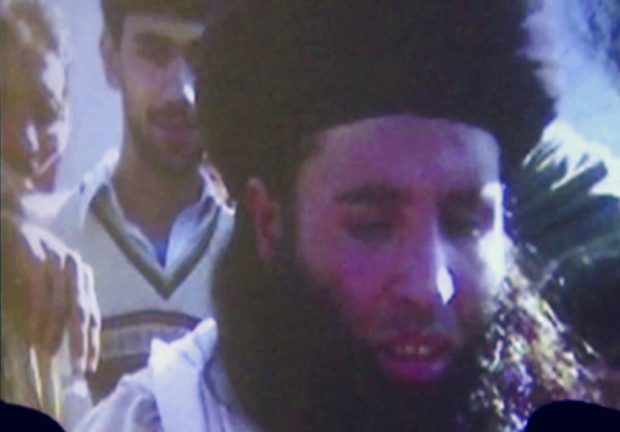Afghan official: US drone kills Pakistan Taliban chief

In this file image made from video broadcast on Nov. 7, 2013, undated footage of Mullah Fazlullah is shown on a projector in Pakistan. An Afghan defense ministry official says Friday, June 15, 2018, a US drone strike in northeastern Kunar province killed Pakistan Taliban chief Mullah Fazlullah. Pakistan has been hunting Fazlullah for several years and has repeatedly said he was plotting attacks on Pakistan from safe havens in Afghanistan. (AP Photo via AP Video, File)
KABUL, Afghanistan—A U.S. drone strike in northeastern Kunar province killed Pakistan Taliban chief Mullah Fazlullah, the insurgent leader who ordered the assassination of Nobel Peace Prize winner Malala Yousafzai, an Afghan Defense Ministry spokesman said Friday.
In a telephone interview, Mohammad Radmanish said Fazlullah and two other insurgents were killed early Thursday morning.
According to a statement attributed to U.S. Forces-Afghanistan spokesman Lt. Col Martin O’Donnell, the U.S. carried out a “counterterrorism strike” Thursday in the border region between Afghanistan and Pakistan targeting “a senior leader of a designated terrorist organization.”
The statement did not say whether the strike had killed anyone and did not identify Fazlullah as the target.
Radmanish said the attack took place in Marawara district, near the border.
Article continues after this advertisementYousafzai survived the assassination attempt in 2012. Fazlullah had ordered her killing for promoting girls’ education. Yousafzai returned to her hometown earlier this year, opening a school funded by a charity she established to promote girls education globally.
Article continues after this advertisementShe has often said that Fazlullah’s attempts to silence her backfired and instead he amplified her voice around the world.
A ruthless leader, Fazlullah ordered the bombing and beheadings of dozens of opponents when his band of insurgents controlled Pakistan’s picturesque Swat Valley from 2007 until a massive military operation routed them in 2009.
His insurgent group, the Tehrik-e-Taliban, also took responsibility for the brutal attack on an Army Public School in Pakistan’s northwestern city of Peshawar in December 2014 when more than 140 children and their teachers were slaughtered.
Survivors of the attack told of insurgents roaming through the school shooting their victims, some as young as six years old, in the head.
Fazlullah rose to prominence through radio broadcasts in Swat demanding the imposition of Islamic law, earning him the nickname “Mullah Radio.” His radio talks also aired the grievances of many in the northwest against the government, such as its slow-moving justice system. He also reached out to women, promising to address their complaints about not getting a fair share of their inheritance.
His brutality often included public beheadings, often of police officers. His exact age is not known but he was believed to be in his late 30s. /jpv